As S’pore’s tourism industry grinds to a halt, businesses and attractions left counting their losses
SINGAPORE — On a typical humid night, Ms Justine Victoria would be weaving in and out of crowds of tourists around the Merlion Park, serving her customers with something cold and refreshing.
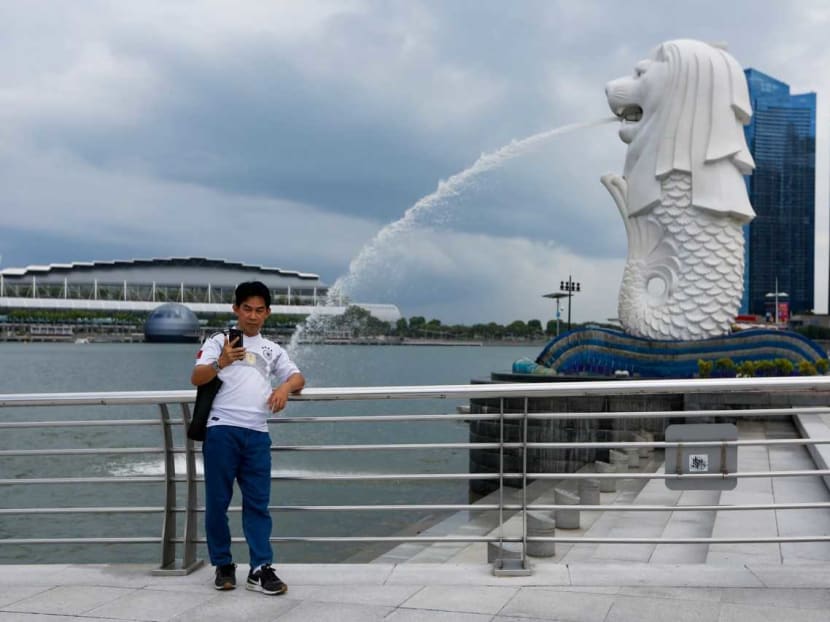
A lone tourist takes a selfie at Merlion Park, in an area that is buzzing with tourists in normal times.
SINGAPORE — On a typical humid night, Ms Justine Victoria would be weaving in and out of crowds of tourists around the Merlion Park, serving her customers with something cold and refreshing.
The 27-year-old manager of J-Cone Jipangyi, an ice cream cafe located near the iconic tourist symbol that gives the park its name, told TODAY of the many nationalities that would stand by the railings facing Marina Bay Sands, waiting for the nightly light show to begin.
But the light shows have stopped, and the once busy promenade is now virtually empty — save for a handful of Singaporeans taking an after-dinner stroll.
Since February, tourists who recently visited mainland China have been barred from entering the city, in a bid to prevent the spread of the Covid-19 disease. This temporary travel ban was extended to all other tourists on Sunday (March 22).
Many businesses that rely on tourism to turn a profit told TODAY that they have seen a dramatic drop in patronage.
Some are adopting a wait-and-see approach to determine how they will ride out the slump, while others have cut the wages of their senior staff.
Ms Victoria, who is from the Philippines, said that she has never seen business this quiet in the three years she has worked at the cafe.
She had not served a single table in the five hours prior to speaking with TODAY at about 9pm on March 17.
Ms Victoria is now worried about her job security, and noted that her compatriots at the Singapore River Cruise were recently let go because of the decline in tourist arrivals.
In response to queries from TODAY, the Singapore River Cruise confirmed that they had to let go of a few of their Filipino employees, though it did not state the exact number.
Mr See Toh Yew Leong, the firm’s general manager, said other measures included reducing the number of hours which boat captains work.
He said the company is also taking the opportunity to send their staff for skills upgrading.
One of its boat captains, a 33-year-old Singaporean man who declined to be named, said he was glad he still has a job. Still, he is worried about how he will support his two young children as his typical 12-hour days have been reduced to about six hours a day.
“We definitely rely on tourists. Singaporeans may have taken this ride before and aren’t likely to return again,” he said.
MIXED APPROACH BY SINGAPORE ATTRACTIONS
At the river’s end at Marina Bay Sands (MBS), several tenants faced a similar plight.
Fashion retailer Philipp Plein said locals account for only about 30 per cent of its clientele, and business has dropped by at least 20 per cent since Chinese New Year.
The retailer’s vice president of operations and marketing, Mr Adrian Lim, said Chinese tourists form for the bulk of their overseas customers.
“Now the strategy will have to change. We will have to focus a little more on the local market,” said Mr Lim.
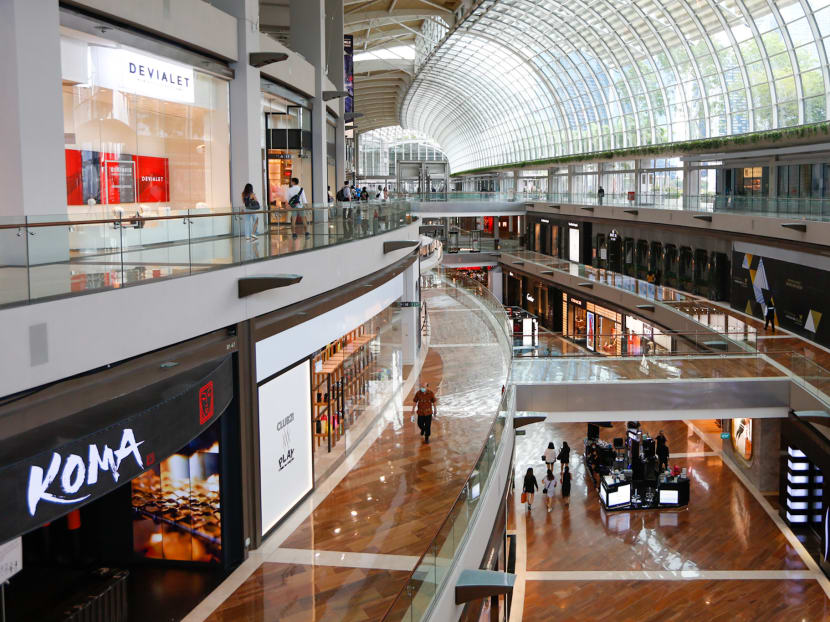
Shoppers were scarce at The Shoppes at Marina Bay Sands on March 24, 2020. Photo: Yong Jun Yuan/ TODAY
In a statement to TODAY, an MBS spokesperson said the company is “actively assisting (the) retailers during the ongoing Covid-19 situation”.
The spokesperson said that various measures, including rental rebates, rent payment instalment plans, shorter trading hours and additional marketing support, have been “rolled out progressively in a targeted and tiered manner”. The assistance is dependent on sales, with priority given to distributors and local retailers.
“We are working hand in hand with retailers to boost foot traffic to the mall and roll out a full suite of tactical marketing measures and shopping incentives catering to a wide range of demographic groups across our different retail categories,” said the spokesperson.
While the mall was generally quiet on the several occasions TODAY visited, employees at the adjoining casino said they have been kept busy with mostly Singaporean patrons.
Aside from the recently implemented safe distancing measures within the casino, a 62-year-old croupier, who declined to be named, said it has been “business as usual”.
Still, he said his colleagues are anxious. Another croupier, who wanted to be known only as Mr Lau, 40, was among those who was worried about his job security.
At the nearby Gardens by the Bay in the afternoon on March 24, TODAY saw few, if any, visitors strolling along the bridges of the popular Supertree Observatory.
When asked how they were dealing with managing their operating costs, a spokesperson for Gardens by the Bay said: “Given the rapidly evolving circumstances, we are carefully considering the next steps forward that balance social responsibility with our national role as a public garden.”
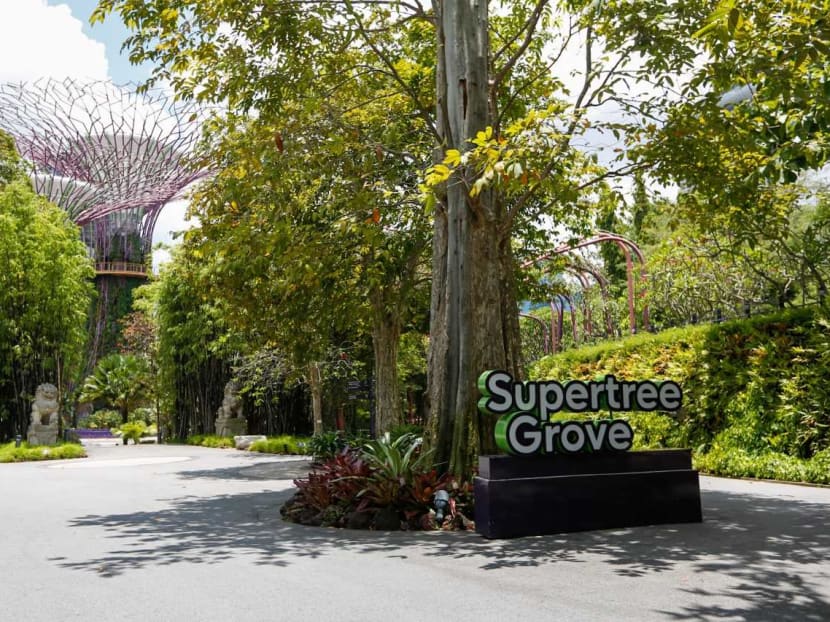
There were far fewer visitors than usual at Gardens by the Bay on March 24, 2020. Photo: Yong Jun Yuan/TODAY
Meanwhile, the management team at Wildlife Reserves Singapore (WRS), which oversees operations at Singapore Zoo, the Night Safari and the River Safari, took a pay cut of up to 15 per cent in early February as one means of reducing operating costs.
“Disruption to international tourism (during the Covid-19 outbreak) is expected to be a protracted one and our corporate focus is to keep jobs,” said Dr Cheng Wen-Haur, deputy chief executive officer and chief life sciences officer for WRS.
Dr Cheng said critical functions that oversee animal care are continuing with full resources.
“But with the sharp decline in park attendance, we have scaled down our food and beverage, retail and ticketing operations,” he said.
Dr Cheng said visitor numbers have fallen by 60 to 70 per cent over the last two months across WRS’ parks. China, he said, is among WRS’ top markets and makes up 15 per cent of all overseas guests at the parks.
“In the meantime, we are leveraging the government’s stimulus package for staff training as well as providing boarding and accommodation for our Malaysian colleagues who chose to stay on in Singapore,” he added.
At Resort World Sentosa (RWS), visitors were sparse when TODAY visited in the afternoon on March 23. A large section of the underground carpark was empty, with its lights switched off. Some taxi drivers said business has been painfully slow.
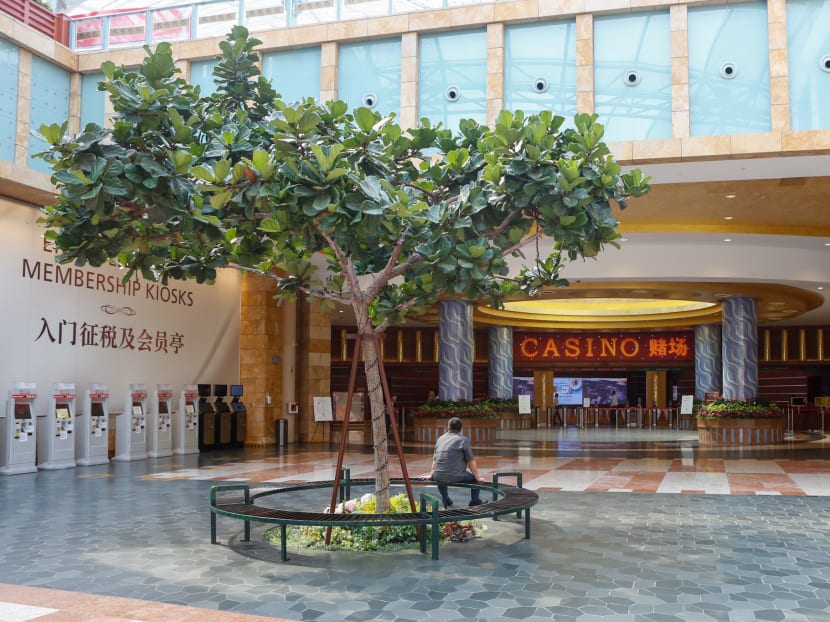
Tourist footfall had visibly decreased around the casino at Resorts World Sentosa on March 24, 2020. Yong Jun Yuan/TODAY
TODAY understands that RWS adopts an energy-efficient policy that reduces electricity usage throughout the resort when footfall is low.
Mr Robert Yong, a manager of Hard Rock Cafe at RWS, said that so far, the only crowd he has seen recently was when the joint held a St Patrick’s Day promotion.
The promotion, which ended on March 22, gave diners a free beer with every burger purchase. It was “very well received”, said Mr Yong.
Still, with the exception of the recent March school holidays, he said business has been bad.
“RWS has extended their promotions to this weekend, but look at the place now. There’s nobody around,” said Mr Yong.
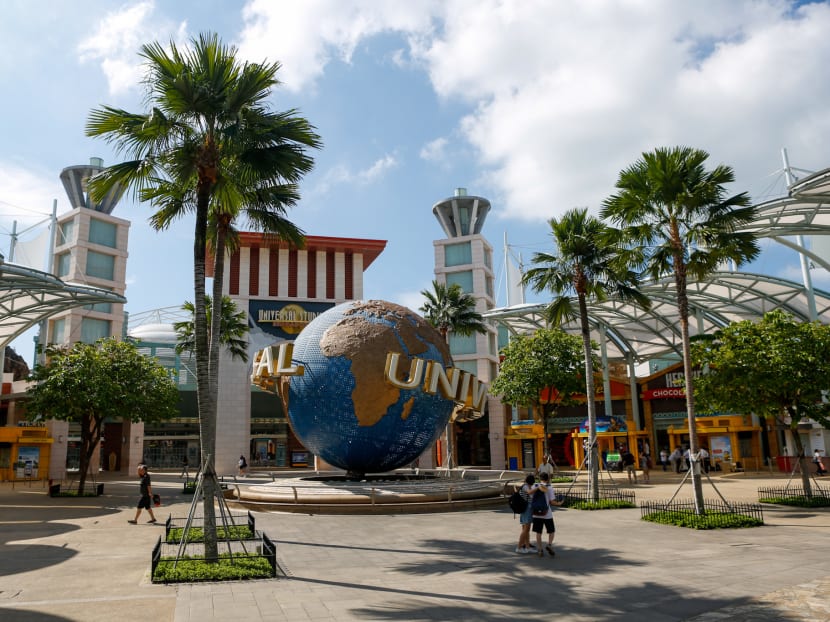
Universal Studios at Resorts World Sentosa was fairly deserted on March 24, 2020. Photo: Yong Jun Yuan/TODAY
RWS had not responded by 9pm on March 24 to questions about how the resort was dealing with the health crisis.
However, according to a Singapore Exchange filing on March 17 by Genting Singapore which operates RWS, the group “is keeping a close watch on the development of the Covid-19 outbreak” and has implemented a reduction in executives’ pay and directors’ fees, as well as adopted certain cost control measures.
These measures include:
A 15 per cent reduction in non-executive directors’ fees for the first quarter of this year
A 18 per cent reduction in the base salary for executive directors
A 9 to 18 per cent reduction in the base salary for all managerial staff
Encouraging employees to take no-pay leave and/or annual leave
EXCEPTIONAL TIMES
CIMB economist Song Seng Wun said the world is facing “exceptional times”, and Covid-19 will not only negatively impact the entire hospitality chain but also badly affect Singapore’s “tiny open economy”.
“Covid-19 is pretty bad compared to Sars… It’s a healthcare crisis that might spill over into a financial crisis, and people all over the globe are affected,” he added.
Ms Shirley Tee, senior manager at Nanyang Polytechnic’s School of Business Management, said that businesses with high fixed costs, and are not scalable in their operations and business model, will find it tough to survive.
“We believe that the hardest hit will be the SMEs (small and medium-sized enterprises) in the tourism industry which might not have the cashflow to tide them through this trying time,” she said.
Deputy Prime Minister Heng Swee Keat will deliver a ministerial statement on March 26 on the Government’s additional support measures for workers, businesses and households in response to the Covid-19 pandemic.
Mr Heng, who is also Finance Minister, said on March 23 this is the first time that the Government is introducing a supplementary budget “so soon after the main budget, reflecting how fast the situation has deteriorated over the past weeks”.
During the Budget statement on Feb 18, Mr Heng had unveiled a S$4 billion Stabilisation and Support Package that contained a range of measures to cushion the blow of the virus on local businesses and workers.
Expecting retrenchments and bankruptcies to pick up if firms are left to fend for themselves, OCBC economist Selena Ling said: “It is not the job of the Government to help all companies survive, but this is an event shock that is coming fast and furious and quickly enveloping the global economy.”
Ms Tee noted that the tourism industry should "start exploring means to move towards a lean operation business model to mitigate the impact caused by Covid-19”. Ms Ling agreed, adding: “Even if the pandemic stabilises, it may still take a bit of time for tourism to regain the trust of people.”
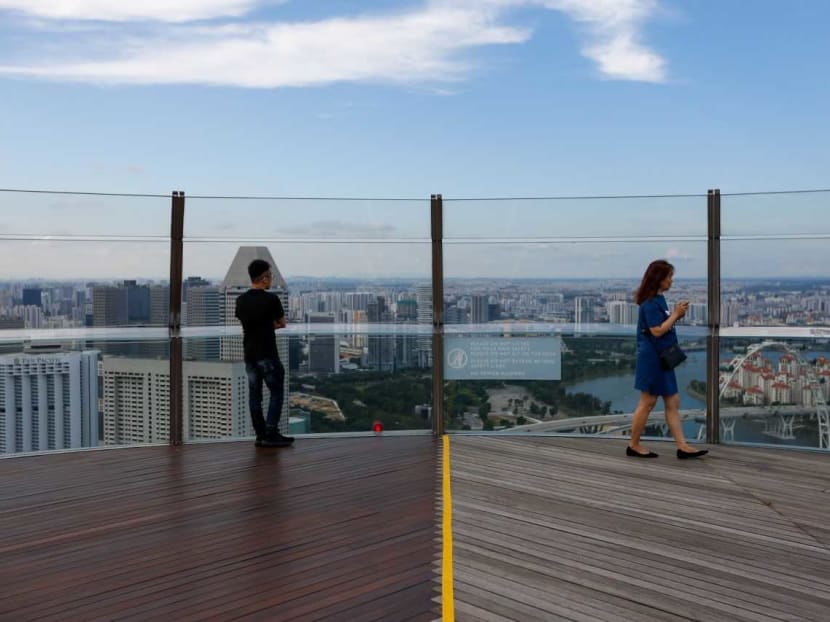
Social distancing was no problem at the Skypark at Marina Bay Sands on March 24, 2020, with few visitors in attendance. Photo: Yong Jun Yuan/TODAY








